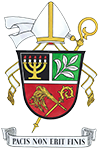PRAYER, STUDY & WORK
The motto Ora et labora – pray and work is attributed to the Order of St. Benedict. Ora, lege et labora – pray, read and work is a true description of our life. Prayer, lectio divina i.e., the prayerful reading of the Word of God – and work are the three supporting pillars of our life since they are ideal ways to encounter God.
PRAYER
Prayer is a moment of an intimate dialogue with God. Just as friends need to see one another and talk to one another, so we too need these moments of intimacy with the Lord. We devote ourselves in different ways a day to at least do personal, contemplative prayer. Liturgical prayer as a community also brings us into contact with God. St. Benedict says in his Rule chapter 43 that: “Nothing is to be preferred to the Work of God” i.e., liturgical prayer.
READING
Lectio divina is also a moment of intimacy with God. Lectio divina is time spent listening to the Word of God, which comes to us in the Bible and in the Church’s Tradition, the writings of the Fathers and Doctors of the Church, and the lives of the Saints. During lectio divina, we try not to miss any of these life-giving words by opening wide the ears of our minds and hearts. In chapter 48 of his Rule, St. Benedict lays down that his disciples should devote themselves to lectio divina at specified periods every day.
WORK
We also encounter the Lord in our work. In chapter 48, St. Benedict explains that “idleness is the enemy of the soul” and stresses that each monk should apply himself to the work he is assigned. Christ himself sanctified work by his carpenter’s craft. Work unites us with Christ. If work is carried out in accordance with the Rule, it does not distract us from God’s constant presence. On the contrary, it fosters silence, humility, obedience and charity. Working relationships help build up the community’s unity. Work also maintains our own psychological balance. We always try to spend our energy by devoting ourselves to some sort of activity.
We believe that work brings us into contact with God. We are convinced of the deep harmony between faith and reason. Monks with artistic gifts are therefore encouraged to explore them. We strive to bring beauty into everything we do. This is a very Benedictine attitude: St. Benedict says that the outer and inner man – his body and soul – should be in harmony. “Let our hearts be in harmony with our voices.” In his exhortation for the liturgy, St. Benedict’s Rule chapter 19 applies to everything a monk does.
Practically, the cellarer oversees various activities – both intellectual and manual – enabling the monastery to earn its living. Chapter 31 of the Rule of St. Benedict paints a demanding portrait of the cellarer. He must be like a father to the community, although not undertake anything without his abbot’s consent. He should listen and understand the needs but also be able to say no if necessary.



